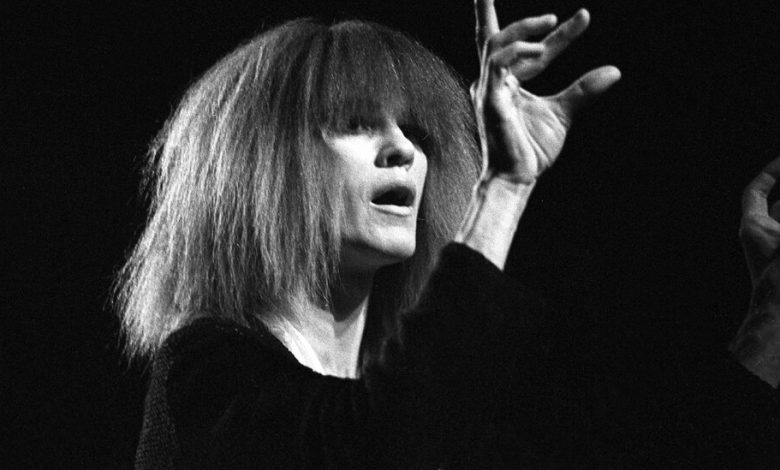Carla Bley, Jazz Composer, Arranger and Provocateur, Dies at 87

Carla Bley, an irrepressibly original composer, arranger and pianist responsible for more than 60 years of wily provocations in and around jazz, died on Tuesday at her home in Willow, a hamlet in upstate New York. She was 87.
Her longtime partner in life and music, the bassist Steve Swallow, said the cause was complications of brain cancer.
Ms. Bley’s influential body of work included delicate chamber miniatures and rugged, blaring fanfares, with a lot of varied terrain in between. She was branded an avant-gardist early in her career, but that term applied more to her slyly subversive attitude than to the formal character of her music, which always maintained a place for tonal harmony and standard rhythm.
Within that given frame, Ms. Bley found plenty of room to confound expectations and harbor contradictions. In the 2011 biography “Carla Bley,” Amy C. Beal described her musicas “vernacular yet sophisticated, appealing yet cryptic, joyous and mournful, silly and serious at the same time.”
Certainly, few composers in Ms. Bley’s generation were as prolific or polymorphic in their output while projecting an identifiable point of view. She wrote elegant, drifting songs that became jazz standards, like “Ida Lupino” and “Lawns”; yearning, cinematic big-band pieces, like “Fleur Carnivore”; iconoclastic rearrangements of national anthems and classical fare; and unwieldy, uncategorizable projects like her jazz-rock opera “Escalator Over the Hill.”
Originally issued on three LPs, “Escalator Over the Hill” was named album of the year by the weekly British publication Melody Maker in 1973, the same year it won a Grand Prix du Disque, France’s most prestigious award for musical recordings. With a surrealistic libretto by the poet Paul Haines, a cast including some of the era’s leading jazz renegades and vocals by Linda Ronstadt and Jack Bruce of the rock band Cream, it captured the woolly, insubordinate spirit of the age, just as it consolidated the elements of Ms. Bley’s style.
That style could be a lot to take in, as John S. Wilson noted a decade later in The New York Times: “She made strong and dramatic use of darkly colored ensembles, of the tuba as a solo instrument or the core of a passage, of trombone solos that could be wildly broad and flatulent or warm and snuggling, of brass-band ensembles with a wry, ragged sound, of saxophones that came squirming up out of stolid fundamentalist ground to a shrill avant-garde ecstasy.”
Ms. Bley’s portfolio as a leader included a big band stocked with some of the leading musicians in New York; a fusionesque sextet, whose ranks included Larry Willis on acoustic and electric piano and Hiram Bullock on guitar; and a chamberlike trio featuring Mr. Swallow and the saxophonist Andy Sheppard. She was the original conductor and arranger of the Liberation Music Orchestra, the revolutionary-minded ensemble formed by the bassist Charlie Haden in 1969, and continued to lead it in tribute after Mr. Haden’s death in 2014.
When she was recognized as a National Endowment for the Arts Jazz Master in 2015, Ms. Bley expressed wonderment, still convinced of her fringe existence. “When I first toured Europe with my own band, the audience threw things at me — and I mean fruit mostly, but bottles too,” she said in 2016. “I loved it. Nobody else got fruit thrown at them. That’s so wonderful! Anything that happened that was out of the ordinary, I appreciated.”
Born Lovella May Borg in Oakland, Calif., on May 11, 1936, Ms. Bley came to music largely through the ministrations of her father, Emil Carl Borg, a church organist, choirmaster and piano teacher. She was 8 when her mother, Arline (Anderson) Borg, died of heart failure.
Ms. Bley’s childhood was dominated by church meetings rather than movies or pop culture. “I was doused in religion, soaked in it, terrified of going to hell,” she recalled in 1974. But she was also an instinctual nonconformist, and by her teens she had broken free of those religious moorings, initially to pursue an interest in competitive roller-skating.
She first encountered jazz at age 12, via a concert by the vibraphonist Lionel Hampton. At 17, she hitchhiked across the country to New York City, epicenter of the jazz scene. She worked as a cigarette girl at Birdland, where the Count Basie Orchestra was often in residence. “I was just this girl from Oakland in a green dress I made myself, looking totally out of place, un-New Yorkerly, holding cigarettes,” she recalled. “I think I was noticeable.”
One musician who took notice was the pianist Paul Bley. They married in 1957, and he encouraged her to write; most of her earliest compositions appeared on his albums. The noted composer George Russell provided further validation when he commissioned her to write for his sextet. Some of her other pieces, like “Ictus” and “Jesus Maria,” were recorded by the clarinetist and saxophonist Jimmy Giuffre’s trio, with Mr. Swallow and Mr. Bley.
Jazz was undergoing a creative revolution in the 1960s — and, partly by association, Ms. Bley found herself at the turbulent center of an emerging avant-garde. She was a founder of the Jazz Composers Guild, which sought better working conditions for musicians. Though short-lived, it yielded a productive institution: the Jazz Composer’s Orchestra, which Ms. Bley formed with the Austrian trumpeter Michael Mantler. After she divorced Mr. Bley in 1967, she and Mr. Mantler married.
Ms. Bley is survived by a daughter from that marriage, the vocalist, pianist and composer Karen Mantler, and by Mr. Swallow, her partner of more than 30 years.
By the late 1960s, Ms. Bley was widely recognized as a composer full of fresh ideas: The prominent vibraphonist Gary Burton featured her music exclusively on “A Genuine Tong Funeral,” an RCA release on which he led an ensemble that included Mr. Mantler, the saxophonist Gato Barbieri and the tuba and baritone saxophone player Howard Johnson, among others.
Those and other musicians from the ranks of the Jazz Composer’s Orchestra formed the core personnel on “Escalator Over the Hill.” Though it was intended for release on a major label, Ms. Bley and Mr. Mantler grew disillusioned with label negotiations and formed JCOA Records to release it — along with the New Music Distribution Service, a pioneering nonprofit distributor for independent releases.
After Ms. Bley received a Guggenheim fellowship for composition in 1972, she and Mr. Mantler formed another label, Watt. It released more than two dozen of her albums over the next 35 years, with distribution through ECM Records.
Ms. Bley had more than fleeting contact with rock: In 1975 she joined a band with Mr. Bruce on bass and Mick Taylor of the Rolling Stones on guitar. And she wrote all the songs for “Nick Mason’s Fictitious Sports,” a 1981 album credited to Mr. Mason, the drummer in Pink Floyd, with lead vocals by Robert Wyatt, formerly of Soft Machine.
During the 2010s, Ms. Bley focused a good deal of her energies on the Liberation Music Orchestra, preserving Charlie Haden’s musical vision as well as his commitment to left-leaning social activism: She included a new version of her late-’60s composition “Silent Spring” on the orchestra’s fifth album, “Time/Life,” released in 2016. As a performer she worked mainly with Mr. Sheppard and Mr. Swallow, touring internationally and releasing several albums for ECM.
Featuring some of Ms. Bley’s sparest and most beguilingly lyrical compositions, these albums — the most recent of which, “Life Goes On,” was released in 2020 — also naturally put a spotlight on her piano playing, which had long been a source of mixed feelings for her.
“I’m a composer who also plays piano,” she told the German journalist Thomas Venker in 2019, “and I sometimes feel I should wear a sign onstage saying ‘She Wrote the Music.’”
But speaking with TheTimes in 2016, Ms. Bley noted with satisfaction that the idiosyncrasies in her playing were her own:
“There’s nobody that plays like me — why would they? So if I’ve had an influence, maybe it would be if they decided to play like themselves. In other words, the whole idea of not playing like anybody is a way of playing.”



